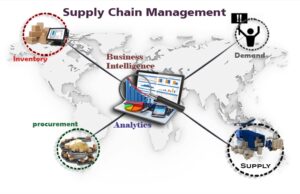Business intelligence (BI) refers to the use of data, analytics, and software tools to analyze and transform raw data into actionable insights. Supply chain management (SCM), on the other hand, is the coordination of activities involved in the production and delivery of goods and services. BI has a significant role in SCM as it enables companies to make data-driven decisions that improve the efficiency and effectiveness of their supply chain operations. This article will discuss the role of business intelligence in supply chain management and how it can be used to optimize supply chain processes.

I. Introduction
A. Definition of Business Intelligence (BI)
Business Intelligence (BI) is a set of tools, techniques, and technologies used to transform raw data into useful insights that can be used to make data-driven decisions. BI involves the use of data mining, data analytics, and predictive modeling techniques to analyze large datasets and identify patterns and trends.
B. Definition of Supply Chain Management (SCM)
Supply Chain Management (SCM) is the coordination of activities involved in the production and delivery of goods and services. SCM involves the management of suppliers, manufacturers, distributors, and retailers to ensure that products are delivered to customers in a timely and cost-effective manner.
C. The Importance of BI in SCM
In today’s competitive business environment, companies are under increasing pressure to optimize their supply chain operations to remain competitive. BI has become an essential tool for companies looking to improve the efficiency and effectiveness of their supply chain operations. BI enables companies to make data-driven decisions that help them optimize their supply chain processes.
II. BI Applications in SCM
A. Data Analytics
One of the most important applications of BI in SCM is data analytics. Data analytics involves the use of statistical and quantitative techniques to analyze large datasets and identify patterns and trends. By analyzing supply chain data, companies can gain insights into their operations and identify areas for improvement.
B. Performance Management
BI can be used to monitor and manage the performance of suppliers, manufacturers, distributors, and retailers. By tracking key performance indicators (KPIs) such as delivery times, order fill rates, and inventory levels, companies can identify performance issues and take corrective action.
C. Inventory Management
BI can also be used to optimize inventory management. By analyzing historical sales data and demand patterns, companies can forecast demand and optimize inventory levels. This can help reduce inventory carrying costs while ensuring that products are available when customers need them.
D. Demand Forecasting
BI can be used to forecast demand for products and services. By analyzing historical sales data and market trends, companies can predict future demand and adjust their supply chain operations accordingly. This can help companies avoid stockouts and reduce inventory carrying costs.
E. Risk Management
BI can be used to manage supply chain risks such as supplier bankruptcies, production delays, and natural disasters. By analyzing supply chain data and monitoring external factors such as weather patterns and political instability, companies can identify potential risks and develop contingency plans to mitigate them.
III. Benefits of BI in SCM
A. Improved Decision Making
One of the primary benefits of BI in SCM is improved decision making. By analyzing supply chain data and identifying patterns and trends, companies can make data-driven decisions that optimize their supply chain operations. This can lead to improved efficiency, reduced costs, and increased customer satisfaction.
B. Enhanced Efficiency
BI can help improve supply chain efficiency by streamlining processes and reducing waste. By analyzing supply chain data, companies can identify inefficiencies and bottlenecks and take corrective action. This can lead to improved cycle times, reduced lead times, and increased throughput.
C. Reduced Costs
BI can also help reduce supply chain costs by optimizing inventory levels, improving transportation routes, and reducing waste. By identifying cost-saving opportunities and taking corrective action, companies can reduce supply chain costs while maintaining or improving service levels.
D. Increased Visibility
BI can provide increased visibility into supply chain operations. By tracking key performance indicators (KPIs) and monitoring supply chain data in real-time, companies can gain a better understanding of their supply chain operations and identify areas for improvement.
E. Improved Collaboration
BI can also help improve collaboration between supply chain partners. By sharing data and insights, companies can work together to optimize their supply chain operations and improve overall efficiency and effectiveness.
IV. Challenges of Implementing BI in SCM
While BI can provide significant benefits to supply chain management, there are also several challenges associated with implementing BI in SCM.
A. Data Quality
One of the biggest challenges of implementing BI in SCM is data quality. BI relies on accurate and reliable data to provide insights and support decision making. Poor data quality can lead to incorrect insights and flawed decision making.
B. Data Integration
Another challenge is data integration. Supply chain data is often stored in different systems and formats, making it difficult to integrate and analyze. Companies must invest in systems and technologies that enable them to integrate and analyze supply chain data effectively.
C. Data Security
Data security is another challenge associated with implementing BI in SCM. Supply chain data contains sensitive and confidential information that must be protected from unauthorized access and cyber threats. Companies must invest in systems and technologies that ensure the security of their supply chain data.
D. System Integration
System integration is another challenge associated with implementing BI in SCM. Companies must integrate their BI systems with their existing supply chain systems and technologies, such as warehouse management systems (WMS) and transportation management systems (TMS). This can be a complex and time-consuming process.
E. Lack of Skilled Personnel
Finally, there is a shortage of skilled personnel with the necessary expertise to implement and manage BI in SCM. Companies must invest in training and development programs to ensure that their employees have the skills and knowledge necessary to implement and manage BI effectively.
##V. Conclusion
BI has become an essential tool for companies looking to optimize their supply chain operations. By providing insights into supply chain data and enabling data-driven decision making, BI can help companies improve efficiency, reduce costs, and increase customer satisfaction. However, implementing BI in SCM is not without its challenges. Companies must invest in systems, technologies, and personnel to ensure that they can leverage the full potential of BI in SCM.
FAQ
What is Business Intelligence (BI)?
Business Intelligence (BI) refers to the use of data, analytics, and software tools to analyze and transform raw data into actionable insights.
What is Supply Chain Management (SCM)?
Supply Chain Management (SCM) is the coordination of activities involved in the production and delivery of goods and services.
How does BI improve SCM?
BI improves SCM by providing insights into supply chain data and enabling data-driven decision making. By analyzing supply chain data and identifying patterns and trends, companies can optimize their supply chain operations, improve efficiency, reduce costs, and increase customer satisfaction.
What are the benefits of BI in SCM?
The benefits of BI in SCM include improved decision making, enhanced efficiency, reduced costs, increased visibility, and improved collaboration.
What are the challenges of implementing BI in SCM?
The challenges of implementing BI in SCM include data quality, data integration, data security, system integration, and a lack of skilled personnel.
How can companies overcome the challenges of implementing BI in SCM?
Companies can overcome the challenges of implementing BI in SCM by investing in systems, technologies, and personnel to ensure that they can leverage the full potential of BI in SCM. They must also prioritize data quality and security and ensure that their systems and technologies are integrated effectively.
What are some future trends in BI and SCM?
Some future trends in BI and SCM include the use of artificial intelligence and machine learning to automate supply chain processes, the adoption of blockchain technology to improve supply chain visibility and transparency, and the use of predictive analytics to improve demand forecasting and inventory management.
What recommendations do you have for companies looking to implement BI in SCM?
Companies looking to implement BI in SCM should start by prioritizing data quality and security and investing in systems and technologies that enable effective data integration and analysis. They should also invest in training and development programs to ensure that their employees have the necessary skills and knowledge to implement and manage BI effectively. Finally, they should stay up-to-date on emerging trends and technologies in BI and SCM to ensure that they remain competitive in a rapidly evolving business environment.
